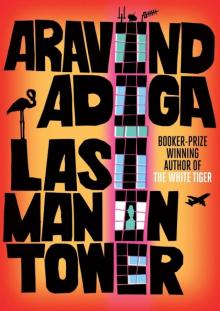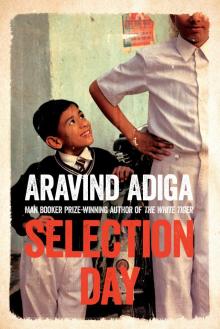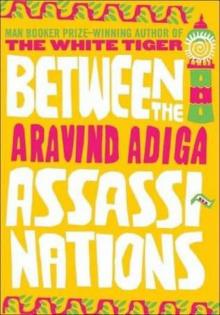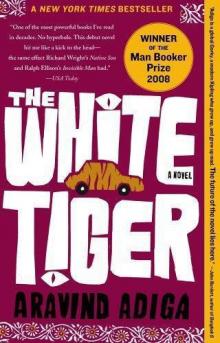- Home
- Aravind Adiga
Selection Day Page 3
Selection Day Read online
Page 3
But Manjunath Kumar, world’s second-best batsman, knew something much more important than how to spell English correctly: Manju knew how to read other people’s minds. It had come to him like one of those special things that some children can do; like being able to move your ears without touching them or curling your tongue up as if it were a dried leaf or flexing your thumb all the way back. If he let himself be still, Manju could tell what other people wanted from him. And he could complete their sentences for them.
He knew that this secret gift, this mind-reading power, had come to him from his mother. Her long, elegant nose; her ravishing smile; her way of looking at him sideways – he remembered all this about his mother. This, too: her sitting on a sofa, fixing her beautiful smile on her visitors, all the time rubbing the silver coin embossed with the image of Lord Subramanya that hung from her marriage-necklace as if it were an amulet that read minds for her. She could always say what her guests wanted to hear, and she pampered them with flattery after flattery, till they left her with their egos refreshed and glowing, as if they had just stepped out of a hammam; and then one day, she read his father’s mind and vanished. That is what saved her from being killed by Mohan Kumar. Manju was sure of it. That is why their mother had never come back to see Radha or him, even though she must have heard they were famous. She was so scared of her husband she had forgotten her sons.
Right now, reading his father’s mind, knowing what he had to do to give him satisfaction and pleasure, Manjunath kept shouting in English, while Radha (who did not have his brother’s secret gift) protested:
‘Didn’t you hear him? Shut up, Manju.’
Manju did shut up: but only because of the grinding noise and a cloud of particulated flour produced by the wheat-mill. It was a tyrant of blue pipes and funnels, the most famous object in the slum, which brought even people from good buildings to Shastrinagar every morning. The noise and choking white dust temporarily pacified the youngest Kumar, but then he began again:
‘Internet Gaming Cyber Mahesh Cafe!’
‘Manju, shut up, I told you. I know English too, but I’m not showing off.’
Following their father, the boys had passed the shuttered shops of their slum, and through a cardboard WELCOME TO OUR HOME arch. The gift of a political party, it was painted blue, and covered by the beaming, disembodied faces of city, statewide and national leaders, at least two of whom were serving jail sentences, a fact which only heightened the impression that they were so many medieval criminals whose grinning heads had been hoisted up above a city gate. An observer from a distance, however, might well judge that the faces on the blue arch were so many genies gathered there to perform friendly magic: for the family Kumar now appeared to be walking on water.
The slum had grown at the very edge of Mumbai’s municipal limits. For most of the year, the Dahisar river was a rock-filled sewer, lit up by egrets and the flutter of a paddy-bird returning to its nest of twigs. A series of bricks, spaced two feet apart in the water, formed a makeshift bridge: their father had hoisted his cycle over his head, and the boys followed him step by step, as they crossed over the river and into the rest of Mumbai.
At the station – get in, get in – Mohan pushed the slow cricketers and their bags into the fast train. Hurry, hurry. Miss this train and there won’t be space on the next one. It’ll be rush hour. Yes, I know there’s an empty seat, but you can’t sit down, Manju. All three of us will stand. I don’t want anyone sleeping in the train and yawning during practice.
A thin, tall gap-toothed child went about the first-class carriage, offering or threatening to polish shoes for five rupees each. Mohan Kumar’s shoes were polished for free. As he worked, the gap-toothed child looked up at the father of cricketers.
‘Young Lions? Young Lions. Young Lions? Young Lions. Young Lions?’
‘I sell unique chutneys,’ Mohan told one passenger after the other. ‘Twenty-four chutneys for each hour of the day. You like Mint? We have Mint. Garlic? We have Extra Garlic. Chilli, Hot Chilli, Green Chilli, Sweet Chilli, Mango, Rainbow, 100 per cent vegetarian.’
Manju leaned his face to his brother’s shirt and dozed against his body.
At Bandra, the family Kumar got off and walked along the pedestrian bridge, a grid of inverted ‘V’s, that zigged and zagged, yellow and metallic, over the swamps and green vacant fields of east Bandra. The sun burned, the wet earth reflected, and the two brothers knew they had to run. Down the yellow bridge, in the direction of the Kalanagar Traffic Signal. Radha surged. Yee-haah. Manju wanted to touch his brother – I’ve caught you, I’ve . . . But to his right (he surrendered a yard to his brother) he saw fields of water-lilies, and right beside them newly rutted mud roads on which men fought to move their motorbikes. He caught up with Radha and they ran past security guards playing with their lathis, and a cluster of Muslim youth with their feet dangling down the bridge. Because their father was now invisible behind them, Radha turned to his brother and—
‘Sofia.’
At once both of them skidded to a halt.
‘Spotty Neck Sofia.’
Putting his hands on his hips, Manju turned his lower lip inside out; while Radha, just a year older but so much wiser, smiled.
‘Everyone saw Young Lions on TV.’ He touched his brother on the shoulder. ‘You’re the brother of a Young Lion. Which girl in school do you like?’
By way of reply, Manju said, ‘Shut up,’ because their father was coming up behind them.
The three walked down from the bridge and went into the suburb of Kalanagar.
An armoured car painted in camouflage drove past them; they had reached the Matoshree compound, home to the most important man in Mumbai. Surrounded by sandbags, a machine-gun unit guarded the home of Bal Thackeray, Permanent Boss of the city. They passed the guns, and roadside canteens serving hot breakfast, and then the Kumars stood before the Middle Income Group (MIG) Cricket Club.
Making his sons wait by the gate, Mohan Kumar negotiated with the security guard:
‘We were on the TV. Young Lions. We’re here to see . . .’
‘Tommy Sir doesn’t come until ten o’clock.’
‘He told us nine o’clock. We came all the way for him. My boys shouldn’t miss a day’s cricket practice.’
‘Can’t practise here,’ the guard said. ‘Down the road.’
Where they found a rubbish dump, and a patch of ragged green beyond it.
Radha and his father took the ragged green. Manju strapped on his pads near the rubbish, one eye on the big holes in the ground. Rat-holes. Tightening his calf-muscle, Manju raised his right foot on a low brick wall to double-check that his pads were fastened. Going down on his haunches, Manju now launched himself over the rat-holes. Master Kumar, Rat-Tamer, jumped up and down; underground, rodents shivered. While doing his jumps, Manju turned himself 180 degrees, to see his father lecturing Radha.
‘The bat is touching your toes, Radha. You won’t be able to drive cleanly.’
Manju saw the irritation on his brother’s face.
But the Man had to be obeyed, and Radha readjusted his stance. From a distance, Manju gripped his bat and waited. Radha Kumar attacked; Manjunath Kumar imitated.
The ball had flown from Radha’s bat to a distant corner of the wasteland, and Manju took off, until his father announced: ‘He who hit it will retrieve it. That is the rule.’
So Radha raised his bat, sucked his teeth, and ran after the ball.
Radha Krishna Kumar meant to honour his end of his father’s contract with God. Two years ago, God sent his living viceroy, Sachin Tendulkar, to meet Radha at a practice match at the MCA grounds: Sachin stood at the wicket, and Radha was tossed the ball by Tommy Sir. The boy, who had let his hair grow long, like Sachin’s, and had watched Sachin’s videos, especially Perth 1992 and Sydney 2004, at least 120 times each, spun the ball right past Sachin’s forward defensive stroke and into his stumps. ‘Well done, sir,’ God’s viceroy said and, as everyone clapped, made Radha the gif
t of his own batting gloves.
At the age of fourteen and a half, Radha was now conscious that his father’s rules, which had framed the world around him since he could remember, were prison bars. He saw the red cricket ball inside a thicket of wild grass and thorns. Getting down on his knees he put his hand into the thorns.
Why must a boy not shave till he’s twenty-one?
Because the cut of a razor makes hormones run faster in his blood.
And why must a boy not drive a car till his father allows him to?
Because indiscipline will destroy anything, even a secret contract with God.
Drenched in sweat and his father’s mad theories, Radha seized the ball and threw it back at Mohan, who had already started stepping back to catch it. Radha admired the method, the textbook correctness of his father’s pose. Before teaching his boys, Mohan Kumar had taught himself the science of cricket. But when the ball landed in his palms, it hit the flesh and bounced out, and Radha smiled, and became a year older.
‘I told you not to come! He hates fathers!’
Radha and Manju saw Pramod Sawant, their head school coach, half walking and half running towards them, pumping his arms.
Mohan Kumar summoned his boys to his side and put his arms on their shoulders, as if posing for a group photo.
‘They’re my children, I made them,’ he shouted back, ‘and neither you nor your Tommy Sir is going to steal them from me.’
Coach Sawant clacked his tongue.
‘Steal them? This boy loves you, Mohan. If anyone says a bad word about his father, Manju will murder them. But for their sake, you must leave now. Tommy Sir’s plan is visionary.’
Mohan Kumar pulled both his restless sons into his body.
‘Why must I leave? My sons always play better when I am watching them. I’ve never heard of a cricket scout who doesn’t like fathers.’
But Coach Sawant reached over and squeezed Mohan Kumar’s right shoulder.
‘Do it for your sons, Mohan . . .’
After a moment, Kumar let go of Radha. Part of any Bombay school coach’s job is to declaw the parent and gently prise from his grip the boys who will contribute to the greater glory of Bombay cricket. Sawant smiled, pointed at Manju, and made ingratiating contractions with his eyes.
‘. . . both your sons, Mohan. And you must go now.’
•
More of Mohan Kumar’s rules for his sons
Cricket Rules
Same as Life Rules. Keep your head absolutely still. Play straight. Do not loft or hit across the line before the time is right. Hoard. Hoard runs on top of hoarded runs.
Food Rules
No Chinese, noodles, potatoes, fried or otherwise, or junk food. No oil, no ghee, no sugar. Green, bright vegetables, rich in antioxidants. If I ever catch you, Radha, eating dosa at that dirty stall near your school, I’ll wake-your-skin-up.
Golden Proverbs
Learn your proverbs, boys. For instance: ‘A thousand maggots in the cow-dung patty, but they’re all dead by sunset.’ Interpretation? Whatever your worries, they’re gone by six o’clock. That’s not a very true proverb, by the way. Here’s one more: ‘On its way into town, the king’s white horse turned into a donkey.’ Think about the meaning of that, my boys. If both of you fail in cricket, boys, the three of us will have to sit outside Dahisar station and beg for our food. But if you really want to understand the life that waits for you as adults, this is the only proverb you need: ‘Big thief walks free. Small thief gets caught.’
How to talk about your father with strangers
There is a Chutney Mafia in this city, run by men called Shetty: and they are determined to crush your father’s life. Do not discuss any aspect of his past, or what happened to your mother, with anyone.
•
Twilight was her favourite hour.
Manju remembered coming home screaming Amma! Amma! only to find their hut empty because his mother was outside, in the strange light, walking in circles by herself. Thinking by herself. Planning something by herself. Perhaps planning to leave him and his brother and run away. Manju breathed slowly. Brilliant sunlight all around – but he was sitting next to his brother, and shaded and protected by Radha Krishna’s bulk, he was free to dream. He kept his eyelids half closed, until Radha said: ‘Manju, this is all bullshit. Total bullshit.’
Manju opened his eyes wide, looked around, and nodded, before he knew what his brother was talking about.
‘That man is never going to give us any money, Manju. It’s a waste of time. Let’s go. What do you say, scientist?’
Forty minutes had passed since Head Coach Pramod Sawant had brought them over to the club, so that they could be shown to the ‘visionary’. Who was apparently the man in the red T-shirt, with the logo that said, Manchester United Gold Key Challenge Supporter.
A dozen boys from Ali Weinberg’s cricket team had been summoned to the MIG club, and were sitting in a circle on the lawn; and they watched Tommy Sir and the man in the red T-shirt describe languid circles around them. That was all the two men had done for three-quarters of an hour.
Leaning back to eavesdrop on the two men as they passed, Manju instead heard his brother’s voice say, ‘Scientist. You know what I’m thinking of right now? She’s got a spotty neck.’
Manju elbowed him away, but his brother kept whispering, ‘Spotty Neck, Spotty Neck.’
All at once, in both boredom and desire, Radha stood up and began dancing as he sang, Spotty Neck, Spotty Neck. Radha was the leader of this group of boys; one day he would be captain of their cricket team. The other cricketers joined him: ‘Spotty Neck, Spotty Neck, she’s got a spotty neck.’ Tommy Sir and the rich man in the red T-shirt took no notice. The boys became louder and louder, as Radha swished his hands like a bandmaster before the swaying, singing cricketers.
Only one boy, Manju observed, was not obeying Radha.
While the other cricketers wore regulation school caps, this fellow had his own cap, monogrammed in gold thread with the initials ‘J.A.’ He had small alert eyes, and a beautiful nose, hooked and swooped, which looked as if it had been made to order. Full black sleeves worn under his cricketer’s white T-shirt rendered his arms sleek, panther-like; and he was rubbing them in alternation, as if getting ready.
The moment he smiled, sickle-shaped dimples would cut into his cheeks. Manju was sure he would see the dimples today, because the last time he and this Mister ‘J.A.’ had been close together, the rich Muslim boy had not smiled. That was after their match with Anjuman-i-Islam. Dusty and sweaty, the cricketers had waited in a queue by the sugar-cane stand, a reward from Coach Sawant for winning the match. Manju had stood right behind Javed. The Muslim boy’s neck, glossy with sweat, was shaved bright below the hairline. When seen from behind, his thick neck conveyed an impression of hidden strength as it expanded into his shoulders. The queue had moved in starts, and the sugar-cane machine had made a tinkling noise as it crushed cane. Before drinking his juice, Javed had lifted his ice-cold glass to the sunlight in an exaggerated flourish that Manju thought might have been meant for his benefit; then, as Manju observed, the powerful throat pulsed and swallowed the juice in one continuous motion.
Now, from opposite points of the circle of white, their eyes met.
‘Enough of this shit.’
Manju started, and then realized he had not said it. Javed Ansari, the Muslim with the majestic nose, had risen up to his feet, making his black-panther limbs even longer.
‘Enough of this shit,’ he repeated.
Radha Kumar stopped singing, took a step back, and sat down.
Now the fellow with the commanding nose was, in a very deep voice, chuckling.
U-ha, U-ha, U-ha.
Manju drew closer to his big brother. Radha was not doing much better. With an open mouth he saw the black-panther limbs come closer and closer to him and his brother.
Choosing a route between the Kumars on his way out, ‘J.A.’ put a hand on Radha’s shoulder and nearl
y kicked Manju in the face as he raised one huge shoe after the other, and left the circle of passive white.
‘Ansari!’ Tommy Sir shouted. ‘Come back. You sit and wait with the others.’
But the boy had left the circle, and was not returning: he kept walking to a car, its door already opened for him by the driver. Slam. Engine on, car gone. He didn’t need any rich man’s sponsorship.
•
A magician came thirty years ago to a village in the Western Ghats with an elephant. Not an elephant that did normal work like moving logs with its trunk or pulling down trees, no. It had a secret power, the magician said. He left the creature in the village square and walked a hundred feet away from it – too far for it to hear him. People gathered around the magician. Young Mohan Kumar was one of them. ‘Whisper a command for the animal into my ear,’ the sorcerer said, ‘any command.’ Mohan Kumar went up to his ear and whispered: ‘Roll on the ground like a baby.’ And then – without a word – the sorcerer just looked at his elephant: which got down on its knees, and thrashed about the ground, kicking up dust everywhere. ‘Raise your trunk and roar three times.’ Again, without a word, the magician forced his elephant to roar. Three times. Mohan watched with his mouth open. That massive beast, with all its muscles, was helpless: it obeyed the brain-waves of its master, it suffered the enchantments of his black magic. When he went back to work, Mohan, a thinking boy, had looked around at the other farmers toiling in the wheat fields, and realized: We are no more unmanacled than that elephant.
This was a truth about life he had never forgotten, even after he had left the village and come by train to the big city. Only recently, Ramnath, his neighbour in the slum, observing that poor Muslims were becoming revolutionaries in Egypt and Syria and kicking out their governments and presidents, had whispered: ‘Maybe the same thing will happen in India, eh?’ Mohan Kumar had smirked. ‘Here, we can’t even see our chains.’

 Last Man in Tower
Last Man in Tower Selection Day
Selection Day Between the Assassinations
Between the Assassinations The White Tiger
The White Tiger The White Tiger: A Novel
The White Tiger: A Novel